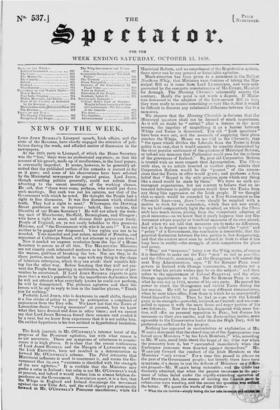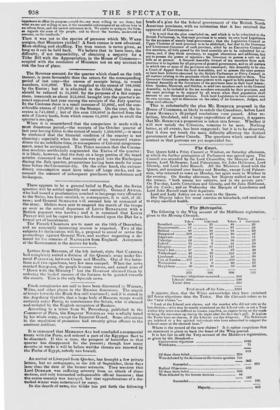The Irish journals in Mr. O'CONNELL'S interest boast of the
progress of the Precursor agitation, but with what reason is as yet uncertain. There are symptoms of reluctance to counte- nance it in high places. It is clear that the recent conferences of Lord JOHN RUSSELL and the Matquis of LANSDOWNE with the Irish Executive, have not resulted in a determination to forward Mr. O'CONNELL'S scheme. The Pilot intimates that Ministerial influence is used to counteract it, and warns the Go- vernment that its own "existence is identified with the strength of the new agitation." It is credible that the Ministers may prefer a calm in Ireland : but calm is not Mr. O'CONNELL'S wish at present, and indeed it would reduce him to almost helpless de- pendence on the Government. Sreculation apart, it is a tact, that the Whigs in England and Ireland discourage the movement against the new Tithe Act, and the wild objects put prominently forward in Mr. O'CONNELL'S Precursor manifestoes; while for
Municipal Reform, and an amendment of the Registration system, there never can be any general or formidable agitation.
Much attention has been given to a statement in the Delfest Northern Whig, that Ministers were desirous of taking the Mu- nicipal Bill as it came from Lord LYNDHURST, and were only prevented by the energetic remonstrances of Mr. CURRY, Menthe: for Armagh. The Morning Chronic:e vehemently asserts the contrary. Really the point is not worth a dispute. If Minis- ters demurred to the adoption of the LYNDHURST Bill in too, they were ready to receive something so very like it, that it would be difficult to discover any substantial difference between the tv o measures.
We observe that the Morning Chronicle is desirous that the Municipal question shall not be deemed of much importance. As it will no doubt be " settled " after a fashion in the next session, the impolicy of magnifying it as a barrier between Whigs and Tories is discovered. The old " Irish questions" have been worn out, and the necessity of supplying their place pinches the Whigs. Hence we are told in the Chronicle. that " the space which divides the Liberals from the Tories in Irish policy is so vast, that it would scarcely be sensibly diminished by the most popular settlement of the question of Municipal Reform, or indeed any measure that Parliament could pass for the redress of the grievances of Ireland." So, poor old Corporation Reform is treated with no more respect than Appropriation. The Chr9- nide also, in an article inserted in another place, admits that Corporation Reform would be the "poorest" of the conces- sions that the Tories in office would grant ; and professes a firra belief that "Repeal is the only question upon which any thing like a stand would be made by them." We have no such extravagant expectations, but are content to believe that an in- terested deference to public opinion would deter the Tories from any thing like aggression on the Irish people. If we thought that so much would be conceded by a Tory Government as the Chronicle fears—yes, fears !—we should be supplied with a motive to wish for its restoration, which does not now exist; for we hold comparatively light the mischief, on which the Chro- nicle lays much stress, arising from the compulsory adoption of good measures—as we know that it rarely happens that any Go- vernment adopts popular or beneficial measures of its own accord. And when we are told that measures are to make no difference, but all is to depend upon what is vaguely called the " spirit" and " policy " of a Government, the conclusion is irresistible, that the practical distinction between the two parties is fast disappearing, and that the contest must soon be reduced in form to what it has lung been in reality—the struggle of rival competitors for place and power. " Men," not "measures," being now the Whig motto, of course it is desirable to make out the Tory "men" as bad as pos:ale; and the Chronicle, assuming ...let the Orangemen will control the next Tory Administration, says, "If Sir ROBERT PEEL must govern in Ireland with Orange instruments, it matters not a straw what his private wishes may be on the subject ;" and then refers to the appointment of Colonel PERCEVAL and the other Orange appointments in 1834. But Sir ROBERT PEEL is now, what he was not in 1834, master of his own party. He proved his power to check the Orangemen and violent Tories during the
last session. He will be placed in very different circumstances, when be next takes office, from those in which he so unexpectedly
found himself in 1834. Then he had to cape with the Liberal party in its strength—powerful, irritated, awl united; and wai coin- pelled to oppose it with the more fierce and eager portion of his own followers. Now the true Liberals, disgusted with mere fac- tion, will offer no personal opposition to PEET., but discuss his measures on their own merits; and the Juste-milieu tactics, more agreeable to the Conservative leader than the High Tory, will be preferred as sufficient for his purpose. Nothing has appeared in contradiction or explanation of Mr. WARD'S statement that the abandonment of the Appropriation was forced upon Ministers " by the Irish Members ;" who, according to Mr. WARD, cared little about the brunt of the tithe war when the peasantry bore it, but "succumbed immediately when the Exchequer processes were directed against themselves." Mr. WARD put forward the conduct of the Irish Members as the Ministers' "only excuse." For a time this passed in silence on the part of the Government people : but latterly there have been symptoms of a desire to rest the defence of Ministers oaa differ. ent ground—Mr. Walla's being untenable; snd the Globe has distinctly admitted, that. when the passive resistant* to the lasy- ment of tithes failed under the rapidly.extending operation of Lord STANLEY'S Act, the means of driving the Chown 110:1: lor submission were wanting, and the sooner the question inti waled the better. We quote the words of the Globe- " What the via inertia—simply letting the law take iteesOttl ezbibee Via impotence to effect its purpose—could do—we were willing to see done; but what we are not willing to see, is the successful enforcement of an odious levy in an odious form, and the useless resistance to it. We prefer to mitigate the forst, as regards the mass of the people, and to throw the burden, moderated in amount, on the landlords."
Then it was not to the species of pressure which Mr. WARD assigns, that Ministers yielded? A fresh excuse is now advanced. More shifting and shuffling. The true reason is never given, as long as it can be held back. We believe that to have been, the difficulty, if not impossibility, of obtaining a majority for a Tithe Bill with the Appropriation, in the House of Commons— coupled with the resolution of Ministers not on any account to risk the loss of place.



























